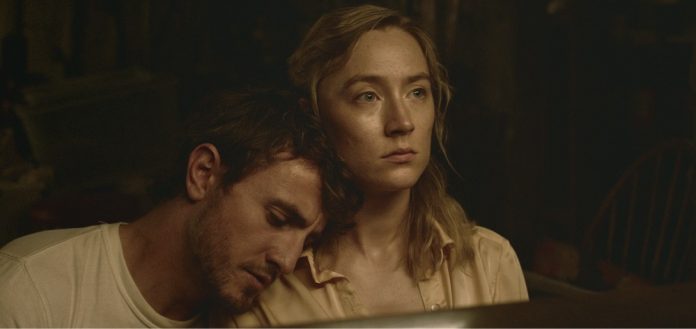In 2016, Australian filmmaker Garth Davis was more known for his commercial and television work than anything else. When his feature directorial debut Lion received six Oscar nominations, it accelerated his career path behind the camera, though his follow-up, Mary Magdalene, got caught up in the sordid Harvey Weinstein saga.
Foe is a very different film for Davis, as it’s much more fantastical this his others. Based on the novel by Iain Reid (I’m Thinking of Ending Things), it stars Oscar nominees Saoirse Ronan and Paul Mescal as Henrietta (aka “Hen”) and Junior, a young married couple living in the Midwest. It’s the near future, and the Earth is in poor shape, prompting the need for further exploration of outer space. One day, a stranger named Terrance (Aaron Pierre) shows up at the couple’s door saying that Junior needs to travel into space as a test subject. Terrance’s presence ends up disrupting Hen and Junior’s already difficult relationship, pushing them to their respective breaking points.
Foe is an intriguing third feature for Davis, somewhat ironic in its release, since, like The Creator, it takes place in the near future in roughly the same time period (the 2060s), and it similarly shows a future that, though familiar, also demonstrates how far AI technology has advanced in the past (i.e. the next) 40 years.
Coincidentally, on Foe, Davis worked with several crew members from Dune — including production designer Patrice Vermette — just as director Gareth Edwards did on The Creator. Clearly, if you want to make a heady sci-fi movie these days with great production value, you call the people who helped Denis Villeneuve bring his grand vision to life.
Above the Line had a chance to speak with Garth Davis shortly after the movie premiered at the 61st New York Film Festival. Enjoy our chat about Foe below!
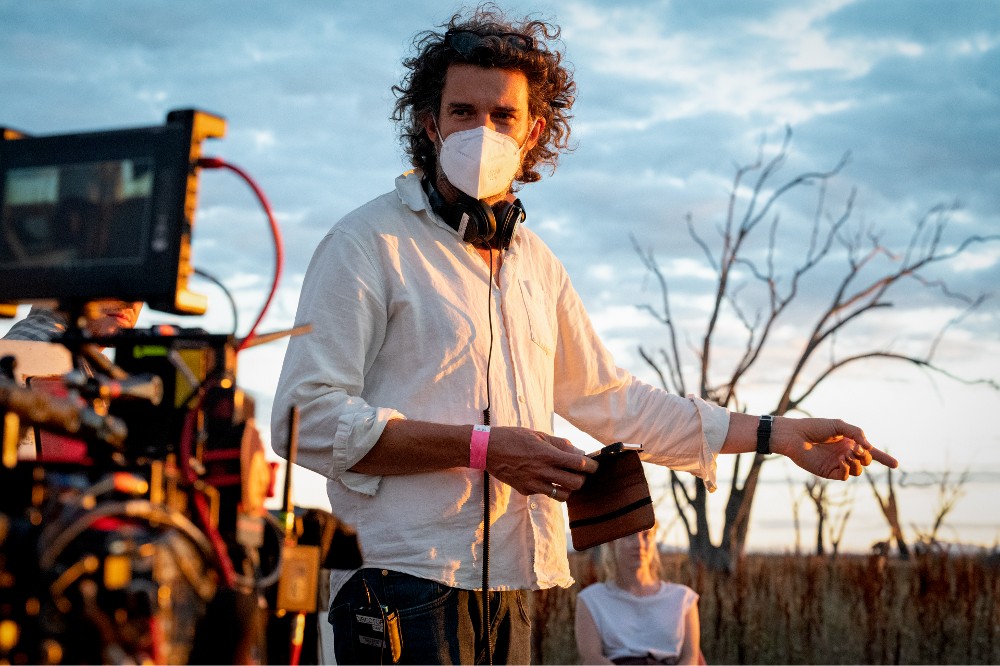
Above the Line: I know Anonymous Content bought the rights to Iain’s book before it was even published, so had you picked up the book completely separately and read it? How did it find its way to you?
Garth Davis: Somebody I’d never met before emailed me saying, ‘Garth, you don’t know me, but I really love your work. I read this book over the weekend, I think you should read it. I think you’d be really good for it.’ I went and bought the book immediately, and I started reading it, and I couldn’t put it down. I rang my agents and said, ‘Look, I’m really interested in this project. Can you check out the rights?’ That’s when I was alerted that Anonymous Content had [the rights], and [Anonymous Content CEO and Founder] Steve Golin and [Producer] Kerry [Kohansky-Roberts] were looking for a director at that exact moment. It was on for young and old, so I had to go and fight for it.
ATL: Was the person who recommended the book to you someone you knew who was actually associated with it?
Davis: It was someone else in the industry [who was] obviously looking at [the] material and just thought of me, so it was very generous of them.
ATL: You actually co-wrote this film with Iain, so how did that come about? Did you first have to pitch your vision for directing the movie to Anonymous Content, and then they introduced you?
Davis: To be honest, it wasn’t the original plan. We did go out to some scriptwriters early on, but availabilities were just incredibly difficult. In the meantime, I decided to go meet Iain in L.A., and I just wanted to get in the room with him for a few days and just go through the book. We got into the room, and we were just page-turning bases. I really had a lot of questions, of course, and realized that all the highlighted paragraphs I had [in my book] matched his highlights.
It was just this thing where we just felt we got along so well, and we understood the material so beautifully, and our ideas seemed to really inspire a vision for the film. We came out of that room and just went into Kerry’s office and said, ‘We would love to have a crack at this. No promises, you can say “no” once you get the draft, but would you let us have a crack at this?’
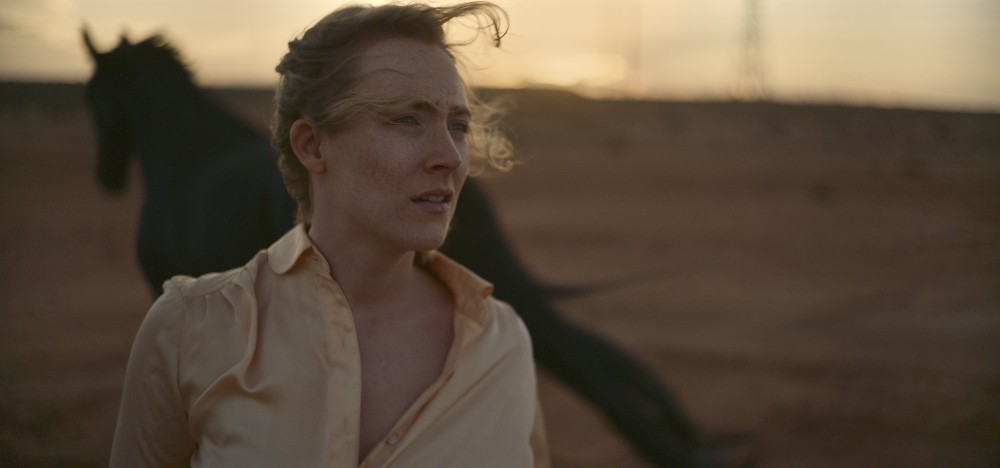
ATL: I’ve spoken to authors who write books and adapt their own work into screenplays, and then there are those who literally just say, “Pay me and good luck.” They want nothing to do with the process and they might simply attend the premiere once a project is finished. I’ve spoken to authors who won’t even watch the movies based on their work. But Iain was into the idea of collaborating and adapting his own work with you?
Davis: Iain Reid is just such a special human being and so unaffected by Hollywood. [He has] zero ego. I guess he was just really inspired by the idea of a collaboration. He had written some screenplay before, but it was just something that he really wanted to do, and was very excited by the collaboration. It was something new and something exciting to him, so it was great.
ATL: I haven’t read the book, but I do want to be careful with spoilers because there are some big ones in there that should be left as surprises. Was there anything in the book that you knew would have to change for the film, in terms of how the story is told?
Davis: I guess the book is more firmly in Junior’s point of view, and it’s like an inner monologue. It’s inner thoughts and memories. I guess that works for a novel, but for film, not necessarily so. That was the biggest shift, and also, I think the thing that affected us the most about the book [was that] we realized the heart and soul of the movie was Hen’s story, in many ways. When we were adapting [it for] film, we brought Hen’s point of view to the front, much more than the book, and I think that was probably the seismic shift.
ATL: This is a three-hander, and I’m not sure whether Paul Mescal had broken out yet when he was cast, but had Aftersun been released yet, or did he have to audition like everyone else?
Davis: No, no, no… actually, we cast Saoirse first. Once she agreed to do it, I then tried to find a match for her, something that felt right. Paul Mescal was mentioned, and he was in Sydney, so I flew to Sydney and met him. He was just so in love with this material and the challenge of playing the multiple versions of Junior. I was sitting there, and it just felt so right.
They’re both from Ireland as well, which wasn’t a planned thing, but it’s so perfect because our characters grew up in this one part of the Midwest. They probably got married straight out of school. The fact that they have that in common just brought this immediate believability to this relationship as well. I got very lucky there.
As you say, Paul was definitely on the rise, and he had to do things in this film I hadn’t seen in his other materials, so he just really blew me away. Both of them are extraordinary, and Aaron Pierre also does an incredible job of bringing nuance to our antagonist.
ATL: I hadn’t seen Aaron in anything, but I know he worked with Barry Jenkins on The Underground Railroad, which is obviously very different than Foe.
Davis: He’s also a theater actor, and he’s got immense gravitas. He’s got these beautiful eyes and this incredible stature. He really loves to think deeply about process and choices, and all of that just felt so right for Terrance. It just felt like the right combination of things to bring Terrance to life, I think, in a really beautiful and surprising way.
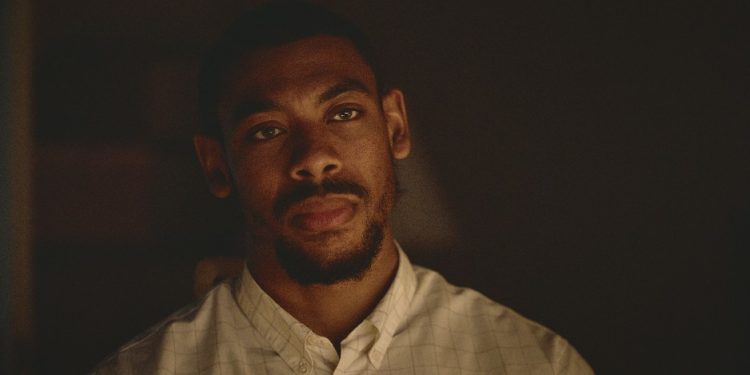
ATL: Was he always going to keep his British accent for the role in order to make him more of an outsider?
Davis: Yes. We committed to the Midwest for lots of reasons. Paul and Saoirse adopted the accent and that was fine, and then I really wanted Terrance to feel like an outsider. Also, OuterMore is an international company, so we just kept his accent because it was kind of perfect. It served everything.
ATL: And then you have these two Irish actors in Australia, pretending to be in the Midwest, which must have been surreal. Did you just find a place in Australia where they could have all those large landscapes and vistas around their house?
Davis: Well, it wasn’t the plan. I was in Canada working on the script then, and we went for a drive through some farms, and we came across this gorgeous farmhouse that just felt like the story. We got chills when we saw it. We fell in love with this house, and we were contemplating, ‘Could we shoot here?’ When Saoirse was available, it was going to be snowing, so that wasn’t going to work, [and] the 40 years in the future decimated world didn’t work in Canada.
When I was back home camping with my family [on] this kind of spontaneous journey, I came across this incredible landscape of all these dead trees, and that’s where the idea dawned on me that we could build the house here to represent the farm. And also, Australia does have these really beautiful, tortured landscapes — these kind of ancient landscapes at Pink Lake — so all of that just really fleshed out this really unique vision of a near-future world.
ATL: How did you work with production designer Patrice Vermette? Did he end up building the farmhouse so it could be shot inside and out?
Davis: Patrice is incredible. He went to the house in Canada and literally forensically studied every bit of it, and then he came to Australia. We adjusted the floor plan, and we adjusted some of the design elements to serve the story [and] to bring the most mystery and tension to the scenes. Once that was done, we built the house on location, and then, we built maybe half the house on stage. We moved between real locations as much in-camera as possible.
ATL: It’s interesting to watch this movie not knowing anything about it in advance. Going in, I knew little about the sci-fi elements or that it even took place in the future. At times, you really lean heavily on these elements, even though it’s really about Junior and Hen’s relationship and what it has to endure. There are things like the space station, and even the chicken factory where Junior works, that have a sci-fi element to them. Did that element come from the book? How did you work with Patrice to develop things like that?
Davis: He doesn’t even work in a chicken factory in the book; he works in a grain factory. We just wanted to try and find something that feels imminent, feels like it’s coming. I feel like genetic engineering, mass tower farming. It is happening in parts of the world with pigs, so it just seemed like a way to infuse that futuristic feel but in a very grounded and kind of alarming way.
What is it really gonna look like for us in 20 or 30 years? What is that really gonna look like? Those were the images that we were trying to find. We always had this idea of one foot in the past and one foot in the future, so it always felt grounded and imminent for the audiences of today.
It’s very simple, just that little tilt-up with the night sky at the beginning of the film. You can see all the star links in the sky, and clearly what looks like some sort of space station. Our sky is gonna look like that. I mean, it just is.
ATL: Visual effects have probably been involved in every movie you’ve done in some way, but Foe requires more than, say, Lion or Mary Magdalene. Did you have someone in VFX working with Patrice very early on to suss all that out?
Davis: I’ve been directing commercials for over 20 years, so I’ve done a lot of crazy stuff, but never really in my movies. This was really exciting to bring out that part of me into the storytelling. I just love that stuff. I love bringing to life these big ideas, like the dust storm, but in ways that feel not so self-conscious, [and] in ways that kind of feel powerful and experiential.
The dust storm only being experienced from the inside of the house, I thought was a really lovely way to handle it. They’re very simple, elegant solutions, but it means the visual FX have to really work because there’s no way to hide — you can’t really cut. That was really fun, and Patrice and I just really got along. He’s the master of taste and aesthetic. We just found those sweet spots on everything, and I’m really proud of the design of the film.
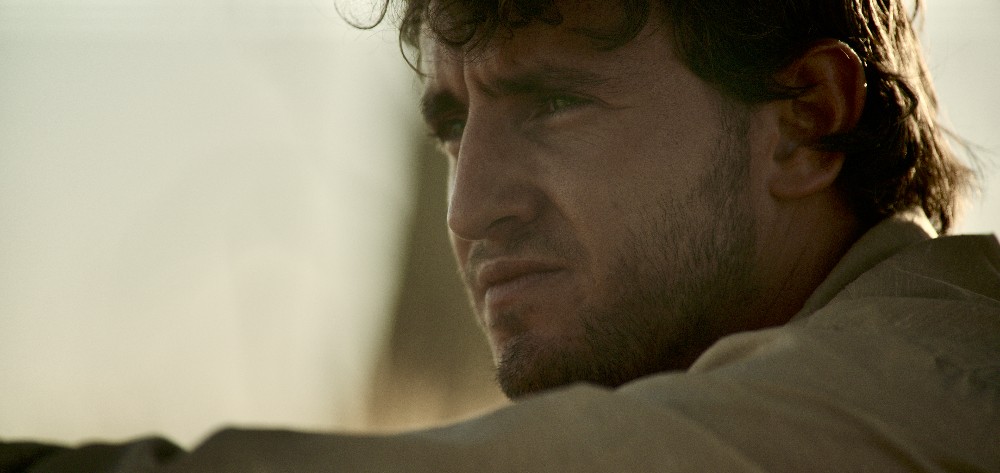
ATL: I think I read that at one point you were involved with directing a Tron sequel and perhaps some other science fiction project, and I was surprised based on what I know of your work in Lion and Mary Magdalene, but have you always wanted to work within that genre?
Davis: The very first movie I watched on a Beta cam machine was Alien, when I was way too young to watch it. I grew up with Ridley Scott and all those guys, and I miss those movies. There’s a big part of me that wants to do that, but it can only be with things that are character-driven [and] feel right. I can’t do it in a shallow way. I guess I’m just waiting for the right moment.
ATL: Going back to Saoirse, she plays piano in this, and she plays quite adeptly, I might add. Did she already have some piano chops, or is that another thing she had to learn to play Hen?
Davis: We had all the bases covered. She did learn the piano. She learned specific parts of some of the key songs, and then we also had a hand double as well, and then we had a remote head on the camera [so that] if we were doing a song that Saoirse hadn’t completely learned, we could use the hand double and put Saoirse into the shot. Again, the intention of everything is that Saoirse is playing the piano, and she is in a lot of cases.
ATL: And those were original songs that Hen is playing in those scenes?
Davis: Yes, that was probably the first cab out of the rank.
ATL: I don’t think I’ve ever heard that term before.
Davis: It’s an Australian term. Sorry about that. Can’t help it, that’s who I am. You know what it’s like. You get into production, and what’s Saoirse going to play? I knew she had to learn the piano, so I wanted that to start very early. We did start looking at pianists and artists, and we ended up with this artist [named] Agnes Obel. She’s Danish [and] based in Berlin.
We sent her the script, which she absolutely loved, and [she] really connected with Hen’s story. Basically, I broke down and gave her a very detailed brief of the arc, and she responded with music. I have to say, it was almost like the first takes of everything became the music we used in the film. The reason why it worked is because she really just channeled Hen.
ATL: Did she do the score for the rest of the film as well?
Davis: No, she didn’t. The piano represents Hen’s inner emotional story, but the rest of the score was a really unique collaboration. It was Oliver Coates and Park Jiha. For Park, this would be her first score. Ollie’s done some before. He’s also worked with Jonny Greenwood. They’re very different artists. Park Jiha, for me, brought the voice of the earth, the elemental nature, and Ollie brought everything else, I guess. When you put that together, it was a really fantastic collaboration. Almost like Iain and I working together, those two worked together as well and brought together this really unique score.
ATL: The movie just had its World Premiere at the New York Film Festival. How nervewracking is it to show your movie for the first time to a festival audience, especially one made up of New Yorkers?
Davis: The audience was amazing. There was a real energy in the room, a lot of reaction to a lot of the scenes. When Hen slaps Terrance, it was rapturous in the room. It was one of those really great screenings, and pretty much everyone stayed for the Q&A. It was very late at night. I felt a lot of love in the room, and the Q&A [was] really engaging [with] a lot of people coming up afterward [and] really, really loving it, and wanting to go and see it again. I thought the night was really successful.
ATL: And Amazon is giving Foe a bona fide theatrical release, which is a little rare. They do a lot of one-week releases, but so far, they haven’t announced anything about a streaming date on Prime Video. Why was it important for you to have people see this in theaters?
Davis: Hopefully, we just keep the dream of cinema alive as much as we can. Everyone working on this movie loves cinema and loves the idea of people going to the big screen and going through that ritual of watching something. We were always going to fight for that, no matter who we work with, and that was one of the caveats with it, but Amazon genuinely loves this movie, and [they’re] right behind it. There’s just a lot of genuine passion for it, so they really want people to see it on the big screen. I couldn’t be more happy with the support I’m getting from them, that’s for sure.
Foe will open exclusively in select theaters on Friday, Oct. 6, courtesy of MGM and Amazon Studios.


